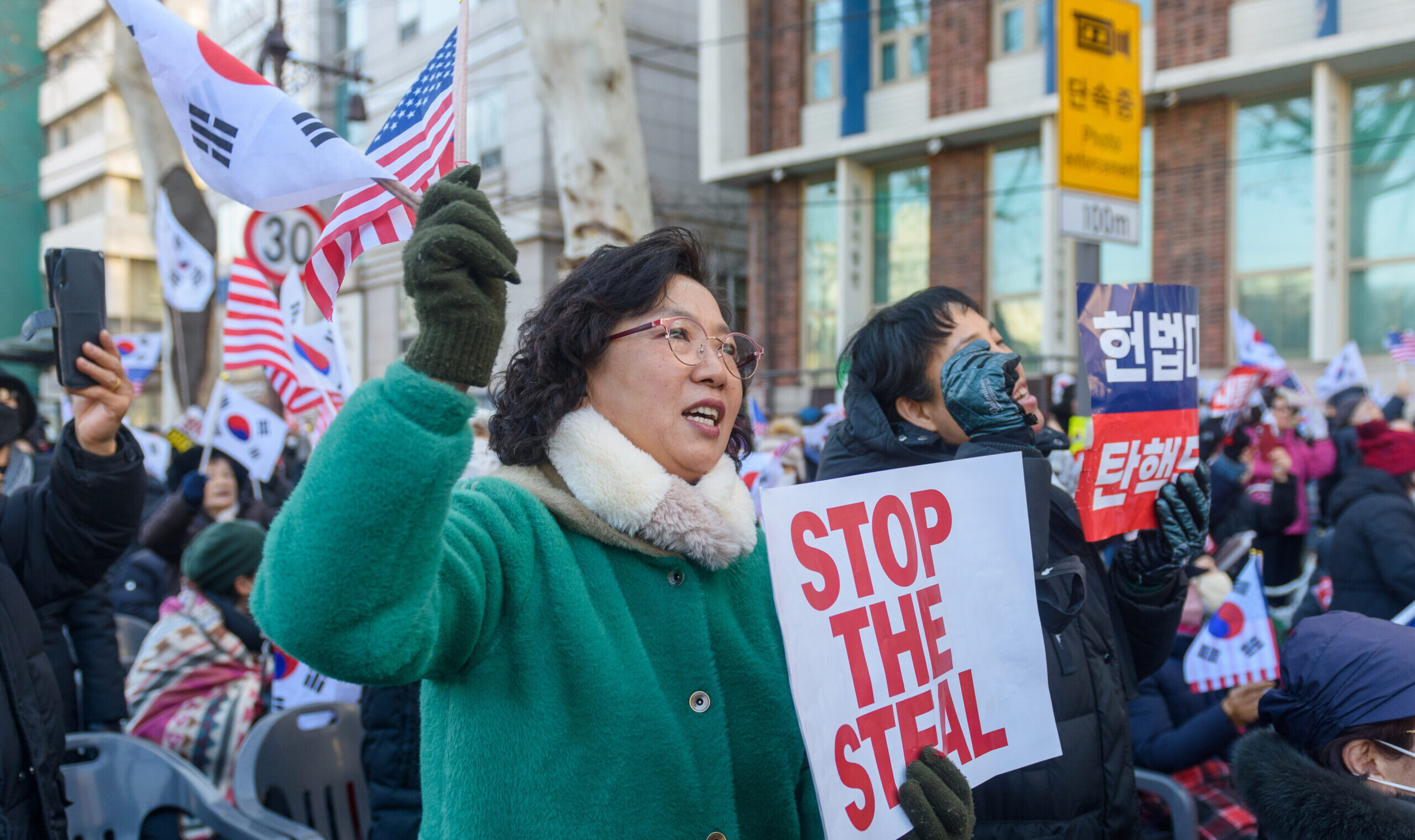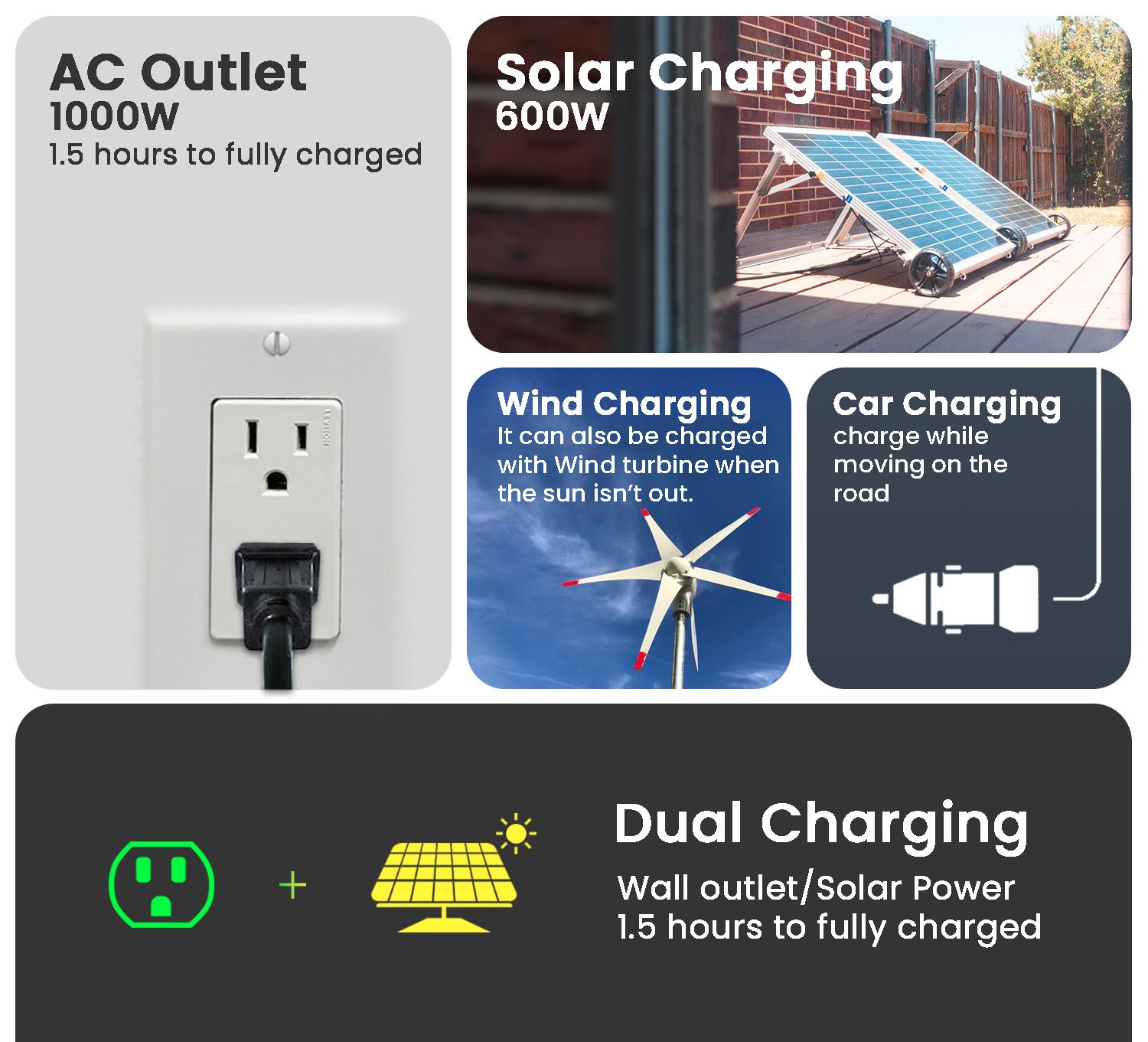Why Are These South Koreans Chanting ‘Stop the Steal’?
South Korea’s slide into constitutional chaos echoes dysfunction in the U.S.—and promises headaches for Washington.

“Unlawful Impeachment!” “Stop the Steal!”
A wave of demonstrators in support of South Korean President Yoon Seok-yul chanted in the streets of Seoul on January 15, as he became the first sitting president in the nation’s history to be arrested by the authorities over insurrection charges. The scene felt almost like a mirror of Washington during the waning days of President Donald Trump’s first term.
The South Korean parliament impeached Yoon on December 14 following his short-lived martial law declaration earlier that month. Along with facing criminal prosecution, the chief executive now awaits a ruling from the Constitutional Court that will ultimately determine the fate of his presidency.
While Yoon is ensnared in the political storm of a lifetime, his supporters stand unwavering. They insist that the president’s martial law decree was a necessary maneuver to break the opposition’s legislative stranglehold and to probe allegations of election fraud.
To his supporters, Yoon is not a rebellion but a victim of an orchestrated campaign by leftist media, lawmakers, and activists hell-bent on toppling his reign. And increasingly, many see parallels between their leader and Trump, who has often found himself equally besieged.
In an exclusive interview, South Korean attorney and prominent conservative commentator Kang Yong-suk spoke with The American Conservative to discuss the battle over President Yoon’s survival and the effort to resuscitate dwindling democracy in his country.
What are your thoughts on President Yoon’s recent arrest?
On January 15, following a failed attempt, the Corruption Investigation Office for High-ranking Officials (CIO) successfully apprehended President Yoon Suk-yeol under a second court-issued warrant. Four days later, on January 19, Judge Cha Eun-kyung of the Seoul Western District Court approved an extension of Yoon’s detention, ensuring he would remain in custody for an additional 20 days, including the initial 48 hours permitted under local law. All this, to say the least, is unprecedented in South Korean history.
I have maintained from the start that the arrest warrant itself is illegal. First and foremost, the CIO lacks the authority to investigate or prosecute the president for insurrection under its mandate. To bypass this, they have resorted to the dubious logic that they can investigate the president for abuse of power, treating the insurrection charge as an extension of that offense. This same reasoning has been used to detain military officials and cabinet ministers involved in the December 3 martial law declaration.
The issue lies in the fact that the president is immune from all criminal prosecution, except in cases of insurrection or inciting foreign aggression. By using a lesser charge as a pretext to investigate a high crime outside their jurisdiction, the CIO has engaged in overreach that constitutes abuse of power in and of itself. If they decide to indict Yoon, for instance, they must hand the case over to prosecutors, as they lack prosecutorial authority. This is pure comedy. The minister of National Court Administration has repeatedly stated that the police, not the CIO, have the jurisdiction to investigate Yoon.
Moreover, numerous reports have surfaced about illegal activities while executing the CIO’s second arrest warrant. Articles 110 and 111 of the Criminal Procedure Code explicitly state that locations requiring military secrecy, such as the president’s residence, cannot be searched or seized without the consent of the person in charge. Similarly, official secrets in the President’s possession cannot be seized without proper authorization. In this case, the person in charge would be the head of the Presidential Security Team. Yet, the authorities executing the second warrant disregarded these procedures, coercing an on-site military commander into authorizing entry into the presidential residence.
Legal experts widely anticipated that President Yoon would exercise his legal right to remain silent if arrested, and that is precisely what occurred. Nevertheless, the CIO, fixated on securing an arrest, pressed forward with detaining a sitting chief executive still embroiled in a constitutional court trial over his tenure. This pursuit of political spectacle over due process signals the death of constitutional order in my country.
Some have highlighted similarities between Yoon and Donald Trump’s situation.
The main opposition Democratic Party leader Lee Jae-myung told foreign media a few weeks ago that he is the “Trump of South Korea.” In reality, it is Yoon’s situation that bears closer resemblance to Trump’s, as both have contended with fiercely left-wing media and baseless fake news throughout their presidencies. When you compare South Korea’s media environment to what Trump faced in the U.S., it’s worse. Trump had supportive outlets like Fox News, but after Yoon’s martial law, almost no media, even from the conservative side, is backing him. The only defenders left are conservative YouTubers and pro-Yoon constituents.
Trump, therefore, turned to platforms like Twitter and TruthSocial to directly engage with his supporters, while also partnering with influential figures like Tesla CEO Elon Musk and UFC President Dana White to overhaul the skewed media landscape. In a similar vein, Yoon has been writing letters to his supporters and following conservative YouTube content, making a concerted effort to appeal to his core base, much like Trump did.
If you look at South Korea’s current political landscape, the pendulum is shifting for Yoon. His approval rating has recently surpassed 50 percent, and the ruling People Power Party’s ratings have overtaken those of the opposition Democratic Party. Trump and the Republican Party managed to overcome immense obstruction from the left to win both the presidential and congressional elections. I’m confident Yoon will likewise prevail against the current leftist maneuvers and ultimately be reinstated.
Do you see parallels between the January 6 incident and the December 3 martial law declaration?
On January 6, 2021, Trump supporters stormed the U.S. Capitol, driven by protests over election fraud. While Trump did not personally orchestrate the event, he recently issued sweeping pardons for those involved. One of the primary reasons Yoon declared martial law on December 3 was to investigate similar allegations of election fraud in South Korea.
Following the January 6 incident, the U.S. Democratic Party moved forward with a second impeachment motion against Trump for inciting insurrection—a situation that mirrors what has unfolded with Yoon.
In both cases, however, I find the charges completely absurd. In South Korea, for instance, to prove that Yoon instigated insurrection, the prosecution must prove that Yoon used the military to overthrow the parliament and started a riot during the decree—neither of which occurred. The soldiers deployed on the streets of Seoul didn’t even carry live ammunition. More importantly, after parliament voted to lift martial law, Yoon complied without hesitation.
Why are pro-Yoon protesters waving American flags and chanting “Stop the Steal”?
Much like during the impeachment of former President Park Geun-hye, American and even Japanese flags have appeared at “pro-Yoon” rallies. Many on the conservative right perceive the current crisis not merely as a domestic political battle but as part of a larger international struggle. They see it as a clash between liberal democracies, like the U.S. and South Korea, and communist regimes, like North Korea and China. It’s almost as if Cold War–era tensions are being resurrected.
Since taking office, President Yoon has worked tirelessly to strengthen diplomatic and security ties between Washington and Tokyo, achieving remarkable successes. Pro-Yoon demonstrators use this as a signal to South Korea’s allies, including those on Capitol Hill, affirming their commitment to defending the liberal democratic order. In contrast, anti-Yoon protesters never raise the American or even South Korean flags—honestly, I’m relieved they don’t choose to wave the North Korean flag.
The slogan “Stop the Steal” at the rally has also caught the attention of foreign media. Initially popularized during the 2020 U.S. presidential election, it became a rallying cry for Trump supporters who claimed widespread election fraud. Controversies surrounding the U.S. election—held under the exceptional circumstances of the COVID-19 pandemic—focused on issues such as mail-in voting, flawed voter rolls, and ghost votes, where deceased individuals were said to have cast ballots. These very same problems surfaced in South Korea’s general elections, leading pro-Yoon supporters to adopt the same slogan.
There is growing unease in the U.S. over liberal Lee Jae-myung’s potential rise to the presidency. Is this concern justified?
If President Yoon is formally removed from office, an early presidential election would be required within 60 days. In such a scenario, the prospect of Lee Jae-myung, a staunch leftist, assuming the helm becomes a real possibility. This should be deeply alarming for those in Washington. Media outlets like [the U.S. government–backed] Voice of America and Republican lawmaker Young Kim from California have already expressed their concerns—and rightly so.
Consider the first articles of impeachment drafted by the opposition parties, which accused Yoon’s administration of provoking North Korea, China, and Russia while pursuing Japan-centered foreign policies. Lee is a known sympathizer of Beijing and Pyongyang and a vocal critic of Yoon’s support for Ukraine. His Democratic Party represents a revisionist force intent on undermining our traditional alliances while cozying up to non-aligned countries. More recently, the Democratic Party cited Yoon’s “anti-North Korea” policy as grounds for a special counsel probe against him.
I would argue that Lee Jae-myung poses an even greater risk than Yoon’s leftist predecessor, Moon Jae-in. Lee’s overtly pro-Pyongyang and pro-Beijing stance would weaken Seoul’s alliances with Washington and Tokyo, especially at a time of heightened geopolitical volatility, and hinder the success of Trump 2.0’s strategy to contain China.
South Korea and its U.S. military bases represent a pivotal frontline in the Indo-Pacific. Major Chinese cities such as Beijing, Tianjin, and Shanghai lie well within the reach of short-range ballistic missiles. We also host the largest U.S. military base overseas, located in the strategically critical seaport city of Pyeongtaek. These vital assets could be jeopardized or even exploited under Lee’s China-friendly policies. Lee might, for instance, allow Chinese nationals or state-affiliated companies to acquire land or buildings near military installations or overlook Beijing’s blatant infiltration activities—issues that have already sparked significant controversies in Canada, Australia, and Switzerland.
Lee’s presidency may also endanger South Korea as a defense and energy partner for Trump 2.0. The incoming president has shown strong interest in South Korea’s cost-efficient and rapid warship-building capabilities, requesting expanded collaboration. Under Yoon’s leadership, our country has also taken a leading role in Small Modular Reactor (SMR) and nuclear power plant development—fields where the U.S. has sought our expertise. Lee and his Democratic Party’s strong anti-nuclear stance and alignment with Beijing, however, cast significant doubt over the future of such cooperation.
What could Washington do to keep Lee in check?
While the U.S. government would understandably refrain from directly intervening in South Korea’s domestic political affairs, it’s not beyond the realm of possibility that the State Department could place Lee Jae-myung on a watchlist and advocate for sanctions, particularly in light of his suspected violations of United Nations resolutions on North Korea.
In addition to his four criminal investigations, Lee is currently embroiled in a third-party bribery trial, in which he stands accused of soliciting Ssangbangwool Group—a South Korean underwear company—to illicitly funnel $8 million to North Korea to facilitate a planned visit to Pyongyang during his tenure as governor of Gyeonggi Province. Last June, Lee was formally indicted in connection with the case. In December, an appellate court upheld the conviction of a former deputy governor of Gyeonggi Province and sentenced him to seven years and eight months in the same case. Should Lee be found guilty, his sentence would likely be twice as long as that of the deputy governor.
Given these mounting accusations, Washington and its allies are fully justified in voicing their concerns. They must remain vigilant and, when necessary, take decisive action to safeguard the integrity of the region’s geopolitical order.
The post Why Are These South Koreans Chanting ‘Stop the Steal’? appeared first on The American Conservative.



